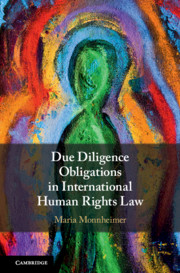2 results
5 - Lessons to Be Learned from the Application of Due Diligence Obligations in Other Fields of International Law
-
- Book:
- Due Diligence Obligations in International Human Rights Law
- Published online:
- 05 February 2021
- Print publication:
- 18 February 2021, pp 142-203
-
- Chapter
- Export citation

Due Diligence Obligations in International Human Rights Law
-
- Published online:
- 05 February 2021
- Print publication:
- 18 February 2021

